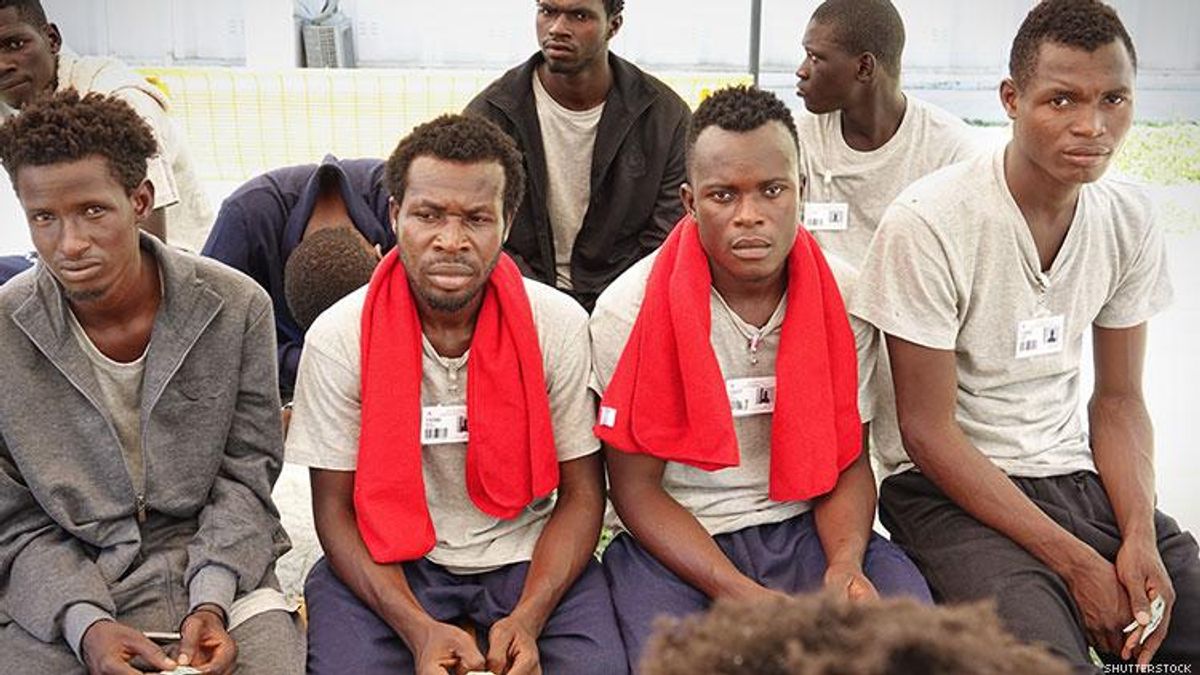Voices
LGBT Africans and Haitians Don't Need Trump's Insults, They Need Asylum

The president's ignorance of the world means he's completely unaware of what queer black people are going through.
January 22 2018 6:08 AM EST
January 22 2018 3:24 PM EST
By continuing to use our site, you agree to our Private Policy and Terms of Use.

The president's ignorance of the world means he's completely unaware of what queer black people are going through.
Donald Trump's proclivity for racist remarks comes as no surprise. His now-infamous comment stating a preference for immigrants coming from a Scandinavian country like Norway rather than from Africa and Haiti, which he depicts as "shithole countries," is based solely on ignorance (also, Mr. President, Africa is a continent). As a matter of fact, black African immigrants are one of the most educated demographic groups in the U.S., surpassing many of those born here -- black or white. According to the Los Angeles Times, they come from five major countries: Ethiopia, Ghana, Kenya, Nigeria and South African.
While Trump's comment will now make it more difficult for these immigrants to enter the U.S., the challenge, however, will be particularly arduous for LGBTQ asylum seekers. These people flee their countries to avoid criminalization, torture, violence, public persecution, political scapegoating, and moral cleansing.
Many of the governments they flee argue that they do not like the world's interference in their business, especially the U.S. They contend that being LGBTQ is anathemas to African and Afro-Caribbean identities, culture, and family values, and that it's one of the many ills brought over by white Europeans (a similar homo/transphobic polemic still argued among religious and uninformed conservative African-Americans). Sadly, the debate between authentically "African" and Western colonial remnants always finds some way to dispute the reality of the black LGBTQ existence. Therefore, coming out as LGBTQ in many of the African and Caribbean countries is inherently dangerous.
For example, approximately 38 of 54 countries in the African continent criminalize same-gender consensual activity.
We all have heard of the human rights abuses of Uganda's LGBTQ population. The country's antigay law, dubbed the "kill the gays bill," initially criminalized same-sex relations. And depending on which category your sexual behavior was classified as -- " aggravated homosexual" or "the offense of homosexuality" -- you'd either receive the death penalty or, if lucky, life imprisonment. (The law has been struck down in court.)
Gay activist David Kato was the father of Uganda's LGBTQ rights movement. He didn't live to receive either punishment. Kato was murdered in January 2011, beaten to death with a hammer.
John "Longjones" Abdallah Wambere, a friend of Kato's and cofounder of Spectrum, an LGBTQ rights organization, is an activist too. Fleeing persecution, Wambere was approved for asylum in 2014. He now lives in my "hood" of Cambridge, Mass.
And last summer, at the 2017 DignityUSA conference in Boston, Warry Joanita Ssenfuka, director of Freedom and Roam Uganda, spoke on being a Catholic lesbian activist in Uganda, where LGBTQI people have no legal protections, and frequently suffer violence and imprisonment. Ssenfuka is a plaintiff in Sexual Minorities Uganda v. Scott Lively. Lively, a white racist, homophobic Pentecostal pastor in Springfield, Mass., is accused of persecuting LGBTQI people abroad, resulting in the introduction of an Anti-Homosexuality Bill he helped engineer in Uganda, which was prosecuted as a crime against humanity under international law.
Throughout the African continent, there are stories of homophobic bullying, trans bashing, and every kind of abuse of LGBTQ people. However, the one country you don't expect to hear anti-LGBTQ rhetoric and human rights abuses from is South Africa.
South Africa is the first African country to support openly LGBTQ civil rights. But South Africa has a problem with its LGBTQ population, especially its lesbians. South Africa's method to remedy the problem with lesbians is "corrective rape."
On any given day in South Africa, lesbians are twice as likely to be sexually molested, raped, or gang-raped than heterosexual women. It's estimated that at least 500 lesbians are victims of "corrective rape" per year. And in Western Cape, a province in the southwest of South Africa, a report put out by the Triangle Project in 2008 stated that as many as 86 percent of its lesbian population live in fear of being raped.
And in Haiti, a country that is predominantly Roman Catholic, homosexuality is condemned. Haiti's LGBTQ middle and professional classes find ways to socialize out of the public eye. For the poorer classes of LGBTQ Haitians, discrimination is commonplace. The 2002 documentary Des Hommes et Dieux (Of Men and Gods) by anthropologist Anne Lescot exposed the daily struggles of Haitian trans women. Blondine says in the film, "When people insult me because I wear a dress I am not ashamed of how I am. Masisis [gay males] can't walk down the street in a wig and dress."
Trump's administration may very well make it difficult for Africans and Haitians to come to the U.S. But he cannot stop asylum seekers.
Legally, it is a universal human right to seek asylum, and the U.S has been offering asylum to LGBTQ people from around the world since 1994. And morally, governments have an obligation to come to the aid of those fleeing persecution, a minimum standard any decent government recognizes.
But as much as Trump's "shithole" comments didn't surprise me, any effort by his administration to halt LGBTQ asylum seekers from black nations would shock me even less.
REV. IRENE MONROE does a weekly Monday segment, "All Revved Up!" on Boston Public Radio and is a weekly Friday TV commentator on New England Channel NEWS. She's a theologian and religion columnist.
Viral post saying Republicans 'have two daddies now' has MAGA hot and bothered